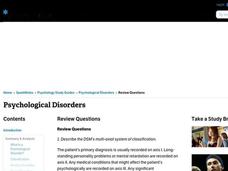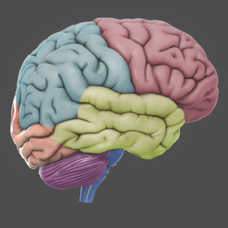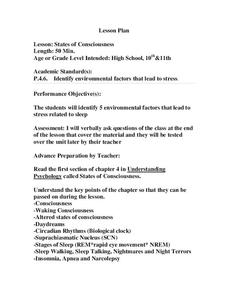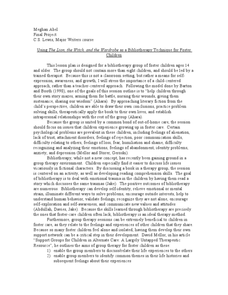Curated OER
Psychological Disorders
Sparknotes provides this 10-question interactive quiz on psychological disorders. It includes questions on drug addiction, OCD, post-traumatic stress, antisocial behavior, schizophrenia, and more.
Curated OER
Psychological Disorders
In this psychology worksheet, students complete 5 short answer questions on pscyhological disorders. They identify characteristics of have certain disorders.
Cold Spring Harbor Laboratory
3D Brain
Imagine being able to rotate the brain and view interior structures without dissection! This tool allows anatomy masters to do just that. They also learn about the associated functions, disorders, and symptoms of damage to each structure.
American Psychological Association
Developing Adolescents
Why to young people act the way they do? Scholars investigate the stages of adolescent development incorporating high school psychology techniques. Using research from the American Psychological Association, they uncover the five areas...
Curated OER
Dysfunctional Eating
Sixth graders study the concept of dysfuctional eating including anorexia nervosa, bulimia nervosa, binge eating disorder, fad dieting, and having an unbalanced diet. They watch and discuss videos about eating disorders and then they...
Curated OER
Playing Psychologist
Young scholars, in groups, research one of the following: Bipolar Disorder, Depression, Anxiety Disorder, Obsessive Compulsive Disorder, Posttraumatic Stress Disorder, Dissociative Identity Disorder, Schizophrenia, and any other...
Curated OER
Mental Disorder T-shirts
Pupils develop a better understanding of mental health and the different types of disorders that people may experience. They create T-shirts that explain and display their learning about a specific disorder.
Curated OER
Reading Comprehension 4 Level 12
Designed for English language learners, this reading passage and its accompanying questions focus on autism spectrum disorders. Find a way to interest your readers before handing them this somewhat heavy reading, as even many...
Autism Speaks
Tips for working with participants with Autism
Everyday life can be overwhelming for a student with autism spectrum disorder. An informative presentation guides teachers through definitions of common attributes associated with autism, as well as ways to meet sensory needs to...
Curated OER
States of Consciousness
Students investigate sleep. In this psychology lesson, students discuss five environmental factors leading to stress related to sleep.
Curated OER
Dysfunctional Eating
Sixth graders write a 1.5 page paper explaining how to make their favorite nutritional snack. They need to assume that the audience has never seen or heard of the snack before.
Curated OER
Moral Development: Lawrence Kohlberg
Students study the stages of moral development. In this psychology lesson plan, students explore Lawrence Kohlberg's stages of moral development as they read, respond to, and evaluate a moral development scenario.
Curated OER
Adrenoleukodystrophy (ALD):A Case Study Using the Film
Students study the genetic disorder Adrenoleukodystrophy (ALD) by viewing the film "Lorenzo's Oil". They complete a summary of the movie and answer questions while viewing the movie. Extensions activities also included.
Curated OER
Abnormal Puzzle
In this health worksheet, students find the words related to abnormal personalities and the answers are found at the bottom of the page.
Curated OER
Reading Comprehension 2: Level 12
Ever heard of CTE? A passage about Chronic Traumatic Encephalopathy (CTE) provides the text for a reading comprehension check. The subject matter is sure to engage your readers and the questions, based on the passage, assess whether high...
American Psychological Association
Memory
How does memory work, and how can we recall more? Here is a five-lesson unit that covers the multi-system model of memory, as well as sensory, working, and long-term memory.
PBS
Stories of Painkiller Addiction: Contemplating Nature vs. Nurture
Does having an addict in your family make it more likely to become one yourself? Explore the genetic risk factors, as well as the prominent environmental influences, for substance addiction in a lesson that encourages awareness and open...
Curated OER
Reading Comprehension 3
Prepare your classes for the impending state testing! Give each student the reading passage and questions, and then set the timer. Encourage them to use specific reading strategies to improve comprehension. They could start by reading...
Open Colleges
Your Brain Map: Strategies for Accelerated Learning
The brain is a complex organ with many different structures and functions. An interactive diagram allows learners to explore the different structures while pop-ups describe their functions. Secondary interactives show the structures of...
National Center for Case Study Teaching in Science
Identical Twins, Identical Fates?
Can different personal experiences affect our genes? Find out in an intriguing case study about one twin who is diagnosed with mental illness and her identical twin who fears she may suffer the same fate. Designed for college-level...
Curated OER
Using The Lion, the Witch, and the Wardrobe as a Bibliotherapy Technique for Foster Children
As the title suggests, this lesson is designed for a foster care therapy group. C.S. Lewis' novel provides children an opportunity to discuss life issues vicariously through fictional characters. However, the discussion questions and...
Curated OER
Own Goals
Learners explore steps to control football violence. For this current events lesson, students listen to a lecture about patriotism, policing, and films relating to British football. Learners debate the efforts taken in Britain to...
Curated OER
Eating a Variety for Breakfast
Students describe different types of breakfasts they would like to eat. They make and eat breakfast food.
Curated OER
Show 303: New Research into Dyslexia
Young scholars explore the causes of dyslexia. They view CT sans and MRIs to view the brain and how it responds. Students read reports about dyslexia. They discuss the nature of dyslexia, its cause, how to diagnose it, and its permanency.

























